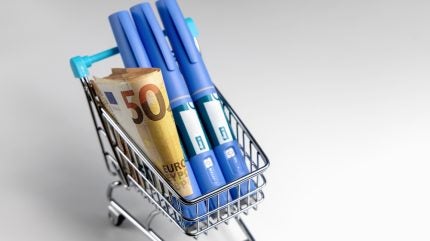
The European Medicines Agency (EMA) has warned of a sharp rise in illegal medicines being sold under the guise of approved glucagon-like peptide-1 receptor agonists (GLP-1RAs).
The agency reported a significant uptick in recent months of illegal products being sold on websites and promoted on social media platforms such as Facebook.

Discover B2B Marketing That Performs
Combine business intelligence and editorial excellence to reach engaged professionals across 36 leading media platforms.
The medicines are not authorised by the EMA and have therefore not met the necessary standards of quality, safety and efficacy. The agency said such products “pose a serious risk to public health”.
The EMA said that Novo Nordisk’s semaglutide and Eli Lilly’s tirzepatide, both approved GLP-1RAs, are amongst those being copied. Semaglutide is sold under the brand names Wegovy and Ozempic for weight loss and type 2 diabetes treatment, respectively, while tirzepatide is sold as Mounjaro for both indications in Europe. Both drugs generate billions of dollars a year as their popularity continues to soar.
Authorities in Europe have identified hundreds of fake Facebook profiles, advertisements and e-commerce listings, many of which are hosted outside the EU. Social media adverts of several websites have been found to misuse official logos and use false endorsements to mislead consumers into thinking they are buying an approved product.
Counterfeit medicines being sold on these platforms may not contain the claimed active substance at all and might instead have harmful levels of other substances.

US Tariffs are shifting - will you react or anticipate?
Don’t let policy changes catch you off guard. Stay proactive with real-time data and expert analysis.
By GlobalDataThe EMA said in a statement: “Illegal suppliers are being actively monitored by national authorities. Enforcement actions include ordering product withdrawals, blocking websites and cross-border collaboration with enforcement officers and other international partners.”
The agency stated that given the lack of regulation over these illegal medicines, people who buy them are at a very high risk of treatment failure, along with unexpected and serious health problems and dangerous interactions with other medicines.
The EMA’s alert adds to a growing global trend of counterfeit GLP-1RAs as fraudsters aim to cash in on the lucrative market. Ireland’s Health Research Board said it detained around 1,400 units of illegal semaglutide and other GLP-1RAs from January to October 2024, compared with 568 detected in 2023.
Meanwhile, the World Health Organization (WHO) alerted countries to the presence of fake batches of semaglutide in circulation in Brazil, the UK, and the US in 2023. WHO’s Global Surveillance and Monitoring System (GSMS) has been observing increased reports on falsified semaglutide products across the world since 2022.
There has been a particular focus on illegal online pharmacies due to lower drug costs and easier access. Global shortages of semaglutide and tirzepatide also led many patients to source alternate routes of procurement. While some bought the vaccines from legitimate online telehealth platforms, others have been duped by vendors posing as regulated sellers.
A viewpoint published in the JAMA Health Forum noted: “Nearly half of online pharmacies offering semaglutide [in the US] may be operating illegally, operating non-delivery scams, or providing products that do not meet quality standards. These illegal operations should not be confused with legitimate, state-licensed pharmacies.
“However, the aggressive marketing tactics by both legitimate and illegitimate companies can be confusing. This is a big departure from typical practice in the US supply chain, which is considered closed and generally impervious to such bad actors.”




